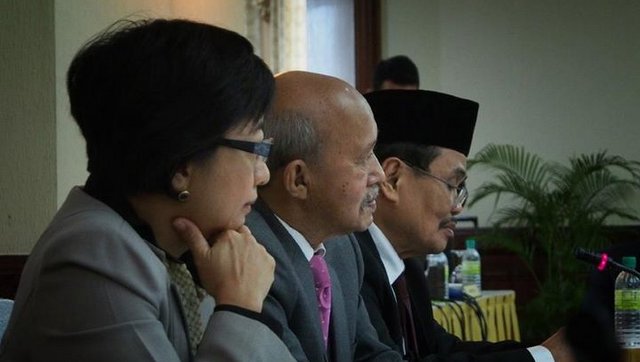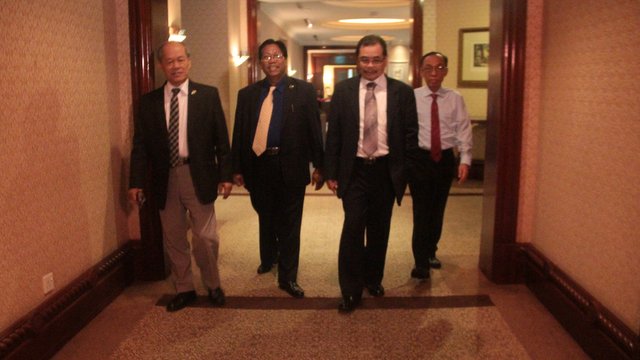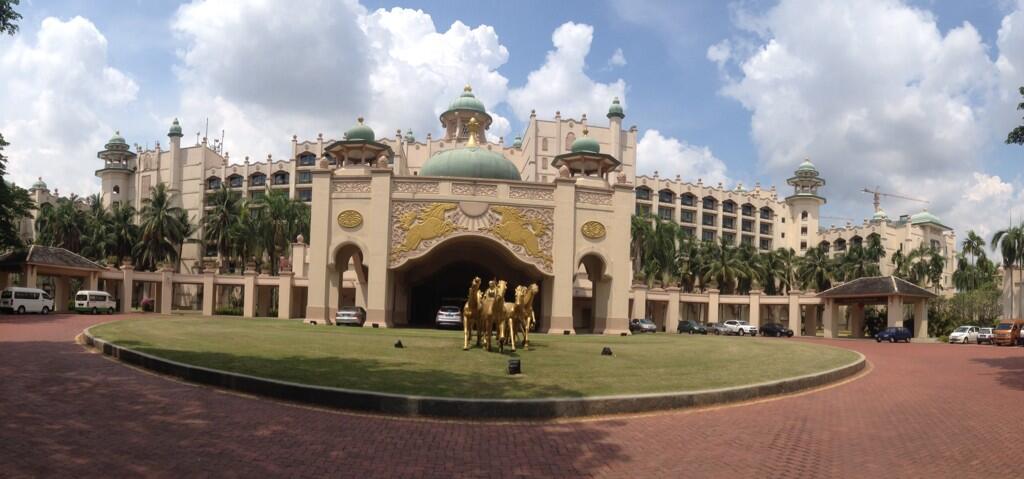
'FINAL STAGES.' Government peace panel chair Miriam Coronel-Ferrer, Malaysian Facilitator Datu Abdul Ghafar Tengku bin Mohamed and MILF chief negotiator Mohagher Iqbal. Photo by OPAPP
The government and the Moro Islamic Liberation Front (MILF) will try to close a deal on how power will be shared between the national government and the proposed Bangsamoro political entity as they hold the 41st round of talks in
The negotiations, which began Tuesday, October 8, are being conducted as
MILF chief negotiator
Mohagher Iqbal recognized in his opening statement what the MNLF achieved for the "long
and protracted struggle" of the Moro people when it signed a peace agreement with the Ramos government in 1996.
"The MILF has never
been remiss in this recognition," Iqbal said. "This is the reason the
MILF had made a stand that it wanted the GRP-MNLF peace pact fully implemented
and what it is negotiating with government is what is lacking in this
agreement, which is diverse and compelling. And more importantly, the fruits of
this current endeavor will redound to the benefits of everybody, including the
MNLF."
The MNLF staged the Zamboanga
siege after it felt sidelined in the ongoing peace process. READ: MNLF, MILF and 2 peace agreements
Both the government and
the MILF have maintained that what the MNLF wants to renegotiate will already
be addressed by the current peace process with the MILF.
"Specifically, that
arrangement must be better than what the MNLF had achieved, lest they will
laugh and mock us no end. More importantly, that agreement will be acceptable
to our people and will lead to solving the Bangsamoro question. Short of this,
our efforts will be in vain," Iqbal said.
In this round of talks,
the government and the MILF will also continue discussing details of the annex
on normalization, which includes the sensitive issues of decommissioning of
arms and disposition of armed forces.


Refrain from
legalism
Both sides had aimed to
sign the annexes on power sharing and normalization – the last two documents
needed to be completed before the final peace pact can be signed – during the 10-day talks held in September, the longest under the
Aquino administration.But the talks started slow after both sides moved to include new details in the annexes. The government wanted to specify items on concurrent or shared powers and exclusive powers of the Bangsamoro government from mere listings to paragraphs.
The MILF also wanted to introduce new provisions regarding the structure of the "ministerial form of government," or how the future Bangsamoro government will take shape.
In a ministerial form of government, people elect members of the legislature, who in turn elect their Chief Minister. It's a deviation from the current system in the Autonomous Region in Muslim Mindanao (ARMM) where members of the legislature and executive branch of government are elected by registered voters.
How this ministerial form of government will take shape, however, won't be defined in full by the final peace pact, government peace panel chair Miriam Coronel Ferrer said in an earlier public forum at the University of the
Ferrer also said the government spent a great deal of last month's session explaining to the MILF that signing a peace pact with the executive branch does not necessarily guarantee that the final peace agreement or the Basic Law will immediately pass the scrutiny of Congress and the Supreme Court.
In her opening statement, Ferrer said: "Indeed, if it has taken us a long while to put down in words and phrases in the Annexes, it is because we want to guarantee the integrity of the outcome."
Iqbal urged both panels "not to engage in too much legalism" to fast-track the talks, and be more flexible in exploring solutions.
Overprotective state?
"Most of the answers to this question are very clear to all of us," Iqbal said. "But what is not openly discussed or admitted is the characteristic nature of states to be overprotective of its powers. I dare say here, almost without exception, that states are selfish in sharing their powers and resources to sub-entities even to the point of depriving other people of...their inherent right to self-determination.
"On the part of the MILF, I think it cannot be faulted for 'asking too much,' or... asking the moon to fall, because what we are only seeking in this negotiation is way below what used to be enjoyed by our forefathers," he added.

FACILITATOR. Where the talks are being held in Kuala Lumpur , Malaysia
Why the peace
talks with the MILF will continue
There's no turning back
for both the government and the MILF.
And if surveys are to be
believed, at least 70% of Filipinos continue to be supportive of the GPH-MILF
peace talks. "It is evident from these survey results that the key question to many people following up this negotiation is not so much IF we will have a peace agreement, but when," Ferrer said. "This impatience and the concern are also driven by the rise in violence perpetrated by those who want this process to fail."
As the government remains committed to talking peace with the MILF, more than 50 cases of attacks by the Bangsamoro Islamic Freedom Fighters, a breakaway group of the MILF, were recorded.
But the ceasefire between the government and the MILF continues to hold.
"This alone is good reason for all those concerned about peace in Mindanao, why it is important to pursue this process between the GPH and the MILF: so that this temporary ceasefire becomes permanent, and in becoming permanent, the other, better things become possible; and so that those who continue to take the path of violence will be isolated, and the rest who commit to peace will coalesce to bring about a broad consensus on the way forward," Ferrer said.
Other government officials are joining the panels for this round. Muntinlupa Rep Rodolfo Biazon, a former armed forces chief of staff, attended the opening ceremonies. Biazon joined the government negotiating team during their Navarra,
Presidential Adviser on
the Peace Process Teresita Quintos Deles and Ifugao Rep Teddy Brawner Baguilat
Jr, as well as "one or more" Cabinet Secretaries and another lawmaker
are expected to follow, Ferrer said.
http://www.rappler.com/nation/special-coverage/peacetalks/40912-41st-round-gph-milf-talks-power-sharing

No comments:
Post a Comment
Note: Only a member of this blog may post a comment.